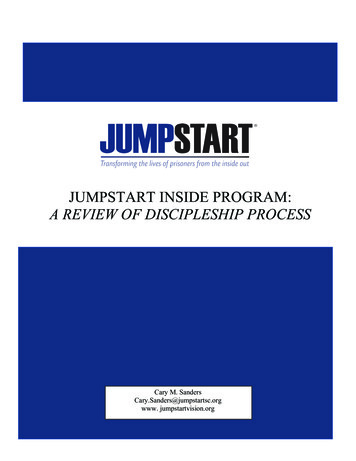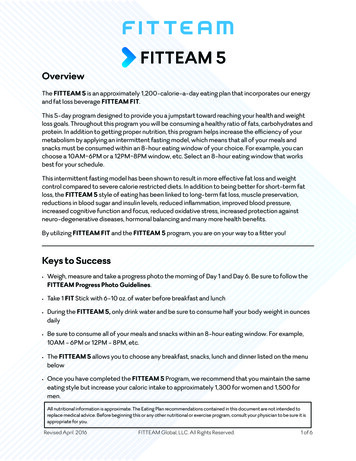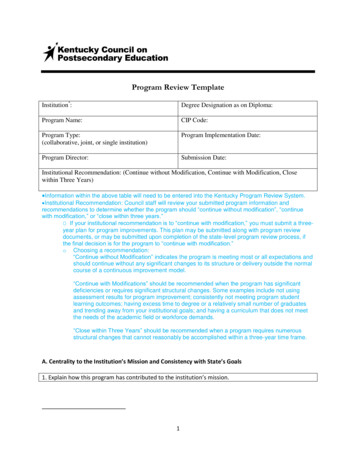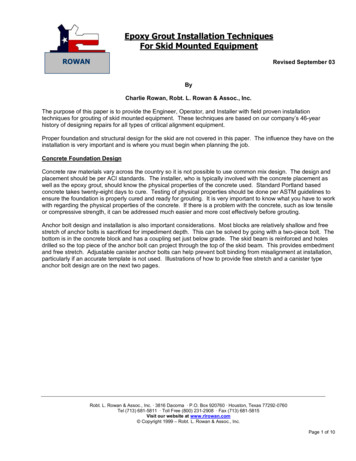
Transcription
JUMPSTART INSIDE PROGRAM:A REVIEW OF DISCIPLESHIP PROCESSCary M. SandersCary.Sanders@jumpstartsc.orgwww. jumpstartvision.org
ContentsIntroduction2Preparation of Inside Leaders and Volunteers2JUMPSTART Discipleship Process: Key Ideas3Curriculum Overview6The Purpose Driven Life6JUMPSTART Participant Lifebook8Bible Study Worksheet9Character Traits11Purpose of Process of Small Groups12JUMPSTART Re-Entry Assessments13Conclusion14Appendix15i
2IntroductionJUMPSTARTÒ is a 501c-3, Non-profit organization that is headquartered in Spartanburg,South Carolina. While the organization is not governed by any denominational organization,their statement of faith reflects and is in agreement with conservative, orthodox Christian beliefs.Funding and volunteers for their work is provided by grants, private donors, and partnershipswith Anglican, Episcopalian, Methodist, Non-Denominational, Presbyterian, and SouthernBaptist affiliated churches. Revenue for funding the program services is also generated byeconomic engines managed by JUMPSTART.The Outside Program is a yearlong transitional program that provides housing, casemanagement, transportation, mentoring, employment, life-skills training and other evidencedbased services that have demonstrated benefit in helping prisoners return to society as productivecitizens.The purpose of this paper is to provide an overview of JUMPSTART’s Inside Program.Preparation of leaders and volunteers, class curriculum, assessment process, and therequirements and expectations of participants will be analyzed. The primary question that will beanswered is: How does JUMPSTART theologically form disciples who live for Christ whileincarcerated and after their release?Preparation of Leaders and VolunteersWell-trained volunteers and inside leaders are instrumental in overseeing and facilitatingthe JUMPSTART discipleship process. Volunteers are primarily members of local churches whohave committed to serving with the program at least once per week in a prison near their home.Inside leaders are incarcerated men and women who have successfully completed the program ina previous year and have been selected and trained to participate as leaders. The Inside Leaders
3are in many ways the genius of the program design. Each week outside of class they are workingwith the participants one-on-one in coaching sessions and by helping the complete theirworkbooks and answer questions or discuss the material as needed. They are serving asmissionaries behind the razor wire sharing the Gospel and discipling others daily.All volunteers and inside leaders are required to successfully complete a six-weektraining program prior to volunteering. Typically, the trainings are completed with inside leadersand volunteers discussing the content and developing as a team before the program begins eachyear. Prior to class each week, inside leaders and volunteers work through six individual lessonsthat are focused on developing and practicing the spiritual disciplines that are essential forbelievers and especially Christian leaders. Then in a group class, the inside leaders andvolunteers review the spiritual discipline and go through the JUMPSTART specific leadershiplessons together. Each week the group classes is structured to discuss the content, share theirresponses to the questions, and hold each other accountable to the practical application exercisesin each chapter. The six spiritual disciplines emphasized are: Personal Bible Intake, PersonalPrayer Life, Fasting, Life-Long Learning, Accountability, and Worship (see Appendix A forsample page). The six JUMPSTART specific topics are: Leaders Own the Cause (of Christ),Leading Group Discussion, Coaching Using Assessments, Completing Bible Study Worksheets,Leading by Listening, and Final Preparations (for leading program). Volunteers and Insideleaders also receive additional content regularly to equip them to serve well in their roles.JUMPSTART Discipleship Process: Key IdeasJUMPSTART’s discipleship process can be better understood by considering several keyideas that shape their curriculum and approach. The first key idea is the organization’s corebelief that fuels their mission and vision. This core belief is, “With Christ, anyone’s future can be
4greater than their past.” “With Christ” is intentionally first because discipleship and lifetransformation begin with Christ. JUMPSTART is not a self-help program. From the outset,participants are taught that life transformation can only begin when one has a healthyrelationship with Christ. In the initial weeks, the Gospel is articulated clearly through preaching,teaching, conversation, and other communication tools to help participants understand andrespond to Christ’s offer of salvation. Second, “with Christ” is important because Christ’ssacrifice ensured that anyone can be justified and transformed to live a life worthy of Christ(Rom. 5:1 & 2 Cor. 5:17). Furthermore, while JUMPSTART understands that one’s choicesprior to Christ have real consequences that do not disappear just because one accepts Christ, it isstill true that one’s future will be greater than their past once they have repented and surrenderedto Christ. While someone may have a life sentence for their crimes that will not be overturned onthis earth, their immediate and eternal future is still greater than their past because of what Christhas accomplished for them and the relationship they have access to with Him.A second key idea that shapes JUMPSTART’s approach is the power of God’s truth totransform lives and set people free from maladaptive behavior and addictions. Good theologyempowers disciples to think correctly and live rightly. What one does or does not do flows fromwhat they believe. Sound theology shapes what one believes and helps them think clearly,properly, and, most importantly, biblically about God. Maturing theologically as a discipleinvolves, “both deprogramming (exposing, critiquing, and correcting the pictures and stories welive by) and reprogramming (replacing the “old self” and the social imaginaries that funded ourformer way of life with the social imaginary generated by Scripture and the gospel.”1 Therefore,JUMPSTART is structured so that participants to learn ho to live out and apply this verse daily,1Kevin J. Vanhoozer, Hearers and Doers: A Pastor’s Guide to Making Disciples through Scripture andDoctrine (Bellingham, WA: Lexham Press, 2019),, 15.
5“Do not be conformed to this world, but be transformed by the renewal of your mind, that bytesting you may discern what is the will of God, what is good and acceptable and perfect (Rom.12:2). As participants are theologically formed by comprehending God’s truth and how Hedefines life and reality, their daily lives will be shaped by this knowledge as they assimilate itinto their lives.A third key idea is that small groups are essential for nurturing life change and growth inChrist. Small groups provide a format where the Christian life can be nurtured and experiencedin a loving community.2 Small groups are conducive for developing self-awareness, allowing forgreater participation, and they provide the structure needed for accountability, assessments, andfeedback. This will be discussed in greater detail after the curriculum is reviewed.A fourth key idea is the power of stories to shape and influence the direction ofindividual’s lives. The time, energy, and money we spend during our time on the world’s stage islargely a function of the stories and images of human flourishing in which we believe and putour trust.3 JUMPSTART structures the program so that throughout the year participants areexposed to the biblical narratives, the life experiences of inside leaders and volunteers, and thestories of previous participants who have done well after returning to society. In the context inwhich JUMPSTART works, ex-offender testimonies by those who have been transformed byChrist are extremely effective and influential in motivating and teaching valuable lessons to theparticipants. Therefore, JUMPSTART desires for the participants to be theologically formed bybiblical stories, images, and personal testimonies as this helps them learn to connect the truth ofGod with their personal story and how they live with Christ as Lord moving forward.2Jeffrey Arnold and Stephanie Black, The Big Book on Small Groups (Downers Grove, IL: InterVarsity Press,1992).3Kevin J. Vanhoozer, Hearers and Doers, 3.
6Curriculum OverviewThe JUMPSTART program curriculum consists of four primary components. The firstcomponent is The Purpose Driven Life written by Rick Warren. The second component whichsupplements and complements The Purpose Driven Life is JUMPSTART’s Participant Lifebook.The third component is a Bible study worksheet that participants are required to complete everyweek. The fourth component is a collection of forty-character traits that participants must learnand interact with during each week of the program. The following sections will outline anddescribe these components and how they are utilized to theological form the participants andnurture their growth in Christian maturity.The Purpose Driven LifeThe Purpose Driven Life centers around the Greatest Commandment (Matt 22:37-40) andthe Great Commission (Matt 28:18-20). Out of these two directives, Rick Warren draws fivepurposes that apply to every believer. The first purpose is that every believer is designed to loveGod with all of their heart. Since everyone was created for God’s pleasure, their purpose is tolove God through worship. The participants learn that authentic worship is not about pursuingwhat pleases them, but about living for what makes God smile. God smiles when one loves Him,trusts and obeys Him, worships Him, and uses their abilities for His glory. In this section,Warren gives practical suggestions for growing as a worshipper through prayer, meditation,honesty, and obedience. This is a core truth for JUMPSTART participants to learn since many oftheir destructive behaviors and addictions are rooted in the worship of idols.The second purpose is that every believer is directed to love their neighbor as themselves.Warren makes the case that everyone has been given a personal ministry that allows them toserve others well and put God’s love on display. The participants learn from the book that
7ministry is not an option for those who have surrendered their lives to Christ. They learn thatserving others is a significant part of what gives one’s life meaning and significance. In thissection they also take an assessment that helps them understand their SHAPE: Spiritual gifts,Heart, Abilities, Personality, and Experience (pg. 236-256). This core truth for JUMSPTARTparticipants is central because prior to incarceration many lived as if life was all about findingpersonal satisfaction and fulfillment, and many were not concerned with how their behaviorimpacted others.The third purpose is that every believer is responsible for living with the commission to“go and make disciples.” Since discipleship begins with receiving the Gospel, Warren makes thecase that every believer has a mission in the world to share the Gospel with those they meet andknow. Warrant teaches that, “fulfilling the evangelistic mandate God has given you will requireabandoning your life agenda for God’s, and that failing to fulfill this mandate is equivalent towasting one’s life” (pg. 285). Participants learn about sharing their life message, which includestheir testimony, the greatest life lessons they have learned, how to articulate the Gospel in awinsome way. This truth is important for those in JUMSPTART because this God given purposewill reorient every aspect of their lives. When one lives with the mission of helping others cometo know Christ, then their words and actions are directed towards this overarching purpose.The fourth purpose finds its roots in the phrase “baptizing them in the name of the Fatherand of the Son and of the Holy Spirit.” This purpose is primarily about identifying with a localchurch in Biblical fellowship and living as a member in God’s family. In the Purpose DrivenLife, the participants learn that fellowship is a wonderful privilege one begins to experience asone joins the family of God in a local church. Participants are expected to attend the local churchwithin their prison and a local church after they are released. They learn that real fellowship is
8characterized by authenticity, mutuality, sympathy, and mercy. In this section, participants learnthat cultivating this kind of community takes honesty, humility, courtesy, and confidentiality.They also learn how to resolve conflict, restore broken relationships, love others well, andprotect the unity of a local church. It is critical for those in JUMPSTART to learn how to be acontributing family member in a local church. In the local church they are nourished anddeveloped, they place themselves in a position to be accountable to other believers, and jointogether with other believers for encouragement as they serve God well in their community.Lastly, the fifth purpose that JUMPSTART desires for the participants to grasp is thedirective to, “teaching them to do all that I have commanded you.” Everyone redeemed by Godhas the purpose of growing into maturity and usefulness for the Kingdom through discipleship(Rom. 8:29). In the Purpose Driven Life, participants learn that: Discipleship is about taking on[God’s] values, attitudes, and character by allowing God to transform the way we think throughHis Spirit and our repentance, by abiding in God’s word, and by persevering through trouble andtemptation. JUMPSTART’s first key to success is, “Live daily surrendered to Jesus Christ.” Asparticipants posture their life with living surrendered to Christ as their primary objective, theywill fulfill all of the purposes for which they were created.JUMPSTART Participant LifebookEach chapter of the JUMPSTART Participant Lifebook is designed to complement andsupplement a chapter of the Purpose Driven Life. After reading a chapter of the Purpose DrivenLife, participants complete a worksheet related to each chapter. Each worksheet has five to eightquestions that are designed to measure the participants comprehension of the material, help themdiscover whether they are living out the truth they have learned, and develop specific plans for
9implementing and living out God’s truth in their day-to-day life. A sample workbook page canbe viewed in Appendix B.Additionally, it should also be mentioned that many of the questions in the workbook aredesigned to be relevant and helpful for those JUMPSTART serves. Research has revealed thatthe majority of the incarcerated grew up in unhealthy home and community environments. 4Many have experienced numerous adverse childhood experiences including verbal, physical, andsexual abuse5, and many have experienced injustice that has led to a distrust and even hate ofauthority. Furthermore, a large majority have used alcohol and drugs since early adolescence.These and other life experiences have contributed to the development of a worldview that is farfrom biblical. Therefore, for JUMSPTART’s discipleship process to be effective, it is critical thatparticipants process and resolve these issues if they are to move forward and mature as disciples.The workbook questions are designed to help the participants begin processing and resolving theissues these type of life experiences have created. A portion of the workbook questions areintended to help the participants become self-aware of how their life experiences have shapedtheir thinking and behavior. Then, they are encouraged to share about these experiences in theirsmall groups and allow their fellow participants, inside leaders, and volunteers to help themprocess their pain, find comfort in God’s healing, and be directed and formed by His truth.Bible Study WorksheetEach week, participants are required to complete a Bible Study Worksheet (Appendix C).The participants are assigned a passage of Scripture and are required to complete the worksheet4Lorraine E. Cuadra, et al., Child maltreatment and adult criminal behavior: Does criminal thinking explain theassociation?, 38 Child Abuse Neglect 1399 (2014),available at: article 1652&context - psychfacpub5Nancy Wolff & Jing Shi, Childhood and Adult Trauma Experiences of Incarcerated Persons and TheirRelationship to Adult Behavioral Health Problems and Treatment, 9 Int. J. Environ. Res. Public Health 1908 (2012),https://www.ncbi.nlm. 8.pdf
10before each week’s class. The questions are grouped under three headings: Head, Heart, andHands and Feet. The questions are structured so that participants first learn truth, then internalizethe truth, and then allow the truth to direct their behavior, words, and actions.Head – God’s Word Transforms My Thinking1. What is the context of the passage? Who was the author writing to? Why was thiswritten?2. What does this passage teach me about God’s Character?3. What truths does this passage reveal that I need to believe?Heart – God’s Word Defines Healthy Emotions & Affections4. What does this passage teach me to love? To hate? To Feel?5. What decisions are being made in this passage? Why are they being made?6. What temptations in my heart does this passage reveal?Hands and Feet – God’s Word Directs My Actions7. Do I have sin to confess and make right? Please explain8. Is there an example in the passage I need to follow? Please explain9. How does this passage show that I can serve God & others?As part of the participants theological formation disciples, there are multiple reasons theyare required to complete the bible study worksheet every week. First, the goal is not forparticipants to just learn what is necessary to avoid returning to prison. Rather, the objective isfor them to live as disciples who are productive members of society and difference makers forGod’s kingdom. Therefore, participants must learn to personally understand and apply God’sWord in every aspect of life. While there is no expectation that they understand God’s Word atthe level of a professional scholar or clergyman, it is imperative that they learn the basics of howto interpret and apply God’s Word. It is a huge win for the participants to learn how to personallyexamine the stories, principles, commandments, etc., and then synthesize these truths intotheological knowledge that can be applied practically in their lives as they live with Christ as
11Lord of their life. In John 8:31-32, Jesus said to those who believed him, “If you abide in myword, you are truly my disciples, and you will know the truth, and the truth will set you free.”As participants learn to abide in Christ and live out His truth, they will not only avoid returningto prison they will be equipped to serve God faithfully.Character TraitsEach week in the JUMPSTART Lifebook, the participants complete a lesson on a specificcharacter trait. In each lesson they learn the definition of a character word, five keys fordeveloping the character trait, and write responses to five applications questions that aredesigned to demonstrate a working knowledge of how to put the character trait into action. Thepurpose of the character studies is to help the participants learn pro-social behavior, develop aframework for acceptable ethics, become self-aware about their own character flaws, anddiscover practical tips that will help them respond in a healthy manner when they are confrontedwith things that challenge their character. One of the more helpful aspects of the characterstudies are the opportunities the participants, inside leaders, and volunteers have to share lifelessons they have learned when their character has been tested. As discussed in detail previously,these personal testimonies and stories are helpful, influential, and formative. Most peoplecomprehend and synthesize knowledge better through stories rather than through abstractprinciples.In many instances the character studies reinforce what participants are learning throughthe Purpose Driven Life content, JUMPSTART Participant Lifebook and Bible StudyWorksheets. When one exhibits and develops godly character in their lives, this is equivalent tobearing fruit for God’s glory. In Gal. 5:22-23, nine fruits of the Spirit are listed and in 2 Peter1:5-8, believers are directed to accompany their faith with seven-character traits. Both of these
12verses point out the importance of developing solid character traits. How all of the curriculum isaffecting life change, developing solid character, and preparing participants for success uponrelease is measured using the JUMPSTART Re-Entry Assessment which will be discussed infurther detail in an upcoming section.Purpose and Process of Small Groups in JUMPSTARTEach week after reading a chapter of the Purpose Driven Life, completing theirJUMPSTART Lifebook worksheet for the week, a bible study worksheet, and the character traitworksheet, the participants attend class. During the class a review of the lesson is provided toreinforce the content, but the majority of the class time is spent in small groups. All classmembers are required to actively participate in small groups to discuss what they have learnedfrom the weeks content and how they have applied and/or struggled to apply the truth in theirdaily lives.Effective small groups are an essential component of the JUMPSTART discipleshipprogram for several reasons. First, developing self-awareness and engaging in personal discoveryoften happens best in a small group setting. In a small group setting, individuals can askquestions, receive feedback, involve themselves in the lives of others, and generally learn to bevulnerable among other people who are going through the joys and challenges of life with them.Additionally, people are more likely to share about their struggles and challenges, and enter intobiblical fellowship in a small group setting.Secondly, small groups allow for maximum participation. In a large gathering, typicallyonly a few people will have the opportunity to share. However, lecture style learning is often notthe most effective way to impart knowledge. Small groups allow for each participant tocontribute and receive specific guidance and support on their discipleship journey. Also, in a
13small group setting, every participant is allowed to share and reflect on personal stories that areconnected to what they are learning. This not only helps them develop self-awareness personallyit also edifies the group as they learn from others struggles and learnings.Thirdly, organizing the participants into small groups with trained inside leaders andvolunteers allows them to be shepherded well and held accountable for completing their workand their behavior. Week after week the participants are revealing what they are learning, thechallenges they are facing, and setting action steps with their group leaders. As the yearprogresses, and trust and relationships are developed, then the volunteers and inside leadersbetter understand how to help those in their care grow in Christ. This structure is also conducivefor gathering info and insight to help with completing the JUMSPTART Re-Entry Assessments.JUMPSTART Re-Entry AssessmentsThree times during the course of the program the participants are assessed to measuregrowth and receive specific feedback for areas in which they need to grow. The participants areassessed by inside leaders, volunteers, and the institutional chaplain using the JUMPSTART Reentry Assessment (Appendix D). Using a Likert scale for twenty-five questions, the assessmentsare designed to measure how well the participants are putting into action what they are learningin the program The first two times the assessments are completed they are used as a coachingtool to help the participants understand specific areas in which growth is needed. After the firsttwo assessments are completed, each participant has a meeting with an inside leader to discusstheir assessment. The primary purpose of these meetings is for the participant to understandwhere they need to grow, be encouraged for where they are doing well and receive specificcoaching for how they can finish the course successfully. The assessments are also valuable fortheological formation. If the participants are not doing well in a particular area, the assessments
14help provide insight into which concepts the participant has not learned and assimilated into theirlife. This provides inside leaders and volunteers with information that is helpful for sheperdingeach participant.The final assessment determines the participants grade for the class. On average,approximately 1000 participants take JUMSPTART each year, but only 40% complete thecourse successfully. If they are not actively living out what they have learned, then they do notpass the course. The final assessment for each participant is completed by JUMPSTART staff,inside leaders, volunteers, and the institutional chaplain (if the chaplain is able and willing). Thiscorroboration as assessments are completed ensures that participants are examined carefullybefore he or she is determined to have successfully completed the program.ConclusionWhile no discipleship process is the perfect process, over the past 10 years JUMPSTARThas developed a track record of proven results. To date, 3,361 participants have completed theprogram successfully and have been released from incarceration. Just over 96% of theseparticipants have not returned to prison and are living as productive members of society.Contrast JUMPSTART’s recidivism rate of 4% with the national recidivism rate of just over70%, and a strong case can be made that contextualized and life-on-life discipleship produceslife transformation, even inside of a prison. JUMPSTART’s emphasis on theological formationand discipleship through quality curriculum, teaching participants to do personal Bible Study,creating an environment of transparency and nurture in small groups, and providing coachingand feedback through assessments is producing disciples that are living lives of purpose thatbring God glory.
15Appendix AThe Bible is Not Just Another BookPower to Change LivesExplains Who We AreGuide for Leading FamilyRoad Map for LifeBalm for Broken HeartsMedicine to Cure the SickWisdom to Correct the FoolishExplains How We Can Relate to GodFurther Questions to Consider:1. When and where each day will you make time to read and study God’s Word?2. Are there any books available to you that will help you learn how to study God’s Word better? Ifso, when will you read them?3. How have you witnessed the power of God’s Word in the past?Write out a closing prayer, asking God to help you use what you have learned to serve others forHis glory.28 JUMPSTART 2017. May not use or reproduce without permission.
16Appendix BWeek 27DefeatInG teMPtatIonBiblical Keys to Defeating Temptation:Ryour attention on something else.Ryour struggle to a godly friend or support group.Rthe devil.Ryour vulnerability.Many think they must be perfect to be considered a mature Christian. Because of this mindset, theydo not even want to admit they battle temptation. This is pride. Now and after your release, you“I have been released from prison for almost 5 years. In that time God has given me a wife,a great job, a church family that loves me, a home, and a lot of great experiences. When Iam tempted, I remind myself of how far God has brought me and I follow the biblical keys todefeating temptation.” — Viengxay Phankhaysy, JUMPSTART Graduate149
17Appendix CPassage Studied:1. Head —God’s Word TransformsMy Thinking2. Heart —God’s Word Defines HealthyEmotions & AffectionsWhat is the context of the passage? Who wasthe author writing to? Why was this written?What does this passage teach me to love?To hate? To feel?What does this passage teach meabout God’s Character?What decisions are beingmade in this passage?Why are they being made?What truths does this passage reveal I need tobelieve?What temptations in my heart does thispassage reveal?3. Hands and Feet —God’s Word Directs My ActionsDo I have sin to confess and make right? Please explain.Is there an example in the passage I need to follow? Please explainHow does this passage show that I can serve God & others?
18Appendix DJUMP START RE-ENTRY ASSESSMENTSBased upon Purpose Driven Life Health AssessmentInmate’s Name:SCDC #:Mentor:Assessment:Score 1-5Date:(5 highest)CONNECT: You were formed for God’s FamilyMember is developing authentic community within the Christian family (interpersonal relationships)Member is more loving, grace giving and forgiving to others than when the class beganMember is intentionally cultivating their relationships with Christian friends and spiritual mentorsMember is sharing about attempts to restore or enhance immediate family relationshipsMembership TotalGROW: You were created to become like ChristMember is sharing with Jump Start family about their growing relationship with God through His Word and prayerMember is responding to challenges with peace and faith rather than anxiety and fearMember is avoiding using addictive behaviors (food, television, busyness, cigarettes, etc.) to meet personal needsMember has a relationship with someone that encourages spiritual healthMember is honoring God by tithing to His Work with whatever means they haveMaturity TotalSERVE: You were shaped for serving GodMember is expressing their unique God-given design as a way of life (dorm, work assignment, institution)Member is open and praying to be used by God and express their unique S.H.A.P.E. for ministryMember is serving in a regular (once a month or better) ministry in the chapel or institutionMember is sharing group ownership by assuming a small responsibility or facilitating a dis
The Purpose Driven Life The Purpose Driven Life centers around the Greatest Commandment (Matt 22:37-40) and the Great Commission (Matt 28:18-20). Out of these two directives, Rick Warren draws five purposes that apply to every believer. The first purpose is that every









